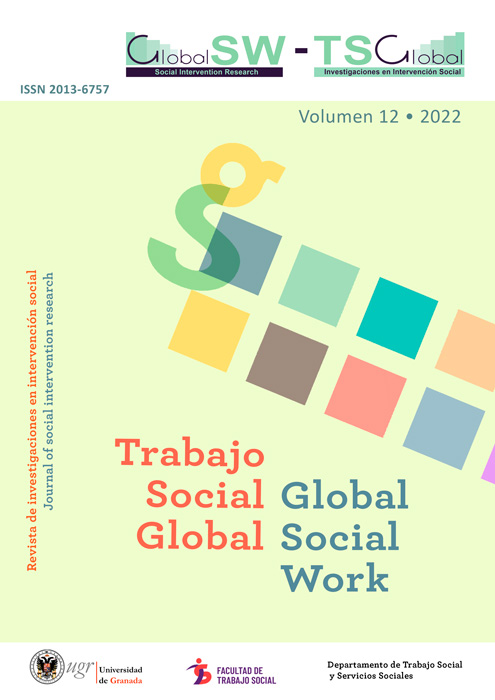Methodological pathways care centers in homeless shelters
In memoriam of Javier Cruz Terán, a psychologist/community worker/researcher in practice
DOI:
https://doi.org/10.30827/tsg-gsw.v12.23499Keywords:
Homelessness, methodology, Shelters, psychosocial supportAbstract
Homeless people are the most excluded individuals of the social pyramid. Just are made visible, but if stigmatized. We describe the work process for attending homeless people in residential centers. We make a theoretical problem of homelessness in the first approximation; we set work schedules, sequenced in phases and point out the importance of human resources in all the way of help. The enhancement of personal resources, the perceived benefit as a driver for change and the direct participation of the homeless on their return to inclusion are the key factors in the working model.
Downloads
References
Cabrera, P. (2007, Octubre 16-17). Desafíos de la pobreza y la exclusión extrema. 6th European Round Table on Poverty and Social Exclusion, Ponta Delgada - São Miguel, Azores, Portugal.
Cruz Terán, J. (Coord.). (2007). Vivir en la calle. Estudio psicosocial sobre las personas sin hogar. Cáritas Diocesana de Granada/SEPISE-Universidad de Granada.
Junta de Andalucía, Consejería para la Igualdad y Bienestar Social. (2011). Grupo de expertos y expertas sobre la atención a las personas sin hogar en Andalucía 2009-2011. Junta de Andalucía.
Muñoz M., Vázquez, C. y Vázquez, J. (2003). Los límites de la exclusión. Estudio sobre los factores económicos, psicosociales y de salud que afectan a las personas sin hogar en Madrid. Témpora.
Rodríguez, A. y Cruz, J. (1999). Exclusión social y personas sin techo en el umbral del siglo XXI. Revista del Ministerio de Trabajo y Asuntos Sociales, 15, 67-87.
Downloads
Published
How to Cite
Issue
Section
License
Authors publishing in this journal agree to the following terms:
- Authors retain their copyright. They guarantee to this journal the right to a first publication of the work submitted to initiate the editorial process.
- Authors know that their work is published under a Creative Commons License which allows others to share it, with a recognition of the work's authorship and its initial publication in this journal.
- Authors share with Global Social Work explotation rights of the work that has been published in this journal, authorizing the execution of a free reproduction, distribution and public communication. Authors know that their work will be stored on servers and reproduced in digital format for inclusion in institutional repositories and databases that will facilitates free access to the full text of the work.
- Authors may distribute the version of the work published in this journal (for example, to an institutional repository or publish it in a book), with the explicit acknowledgment of its initial publication in this journal.
Copyright on the texts published in Trabajo Social Global -Global Social Work, as well as editorial policy of the journal refering to self-file and deposit in institutional or thematic repositories, are identified in the database





















